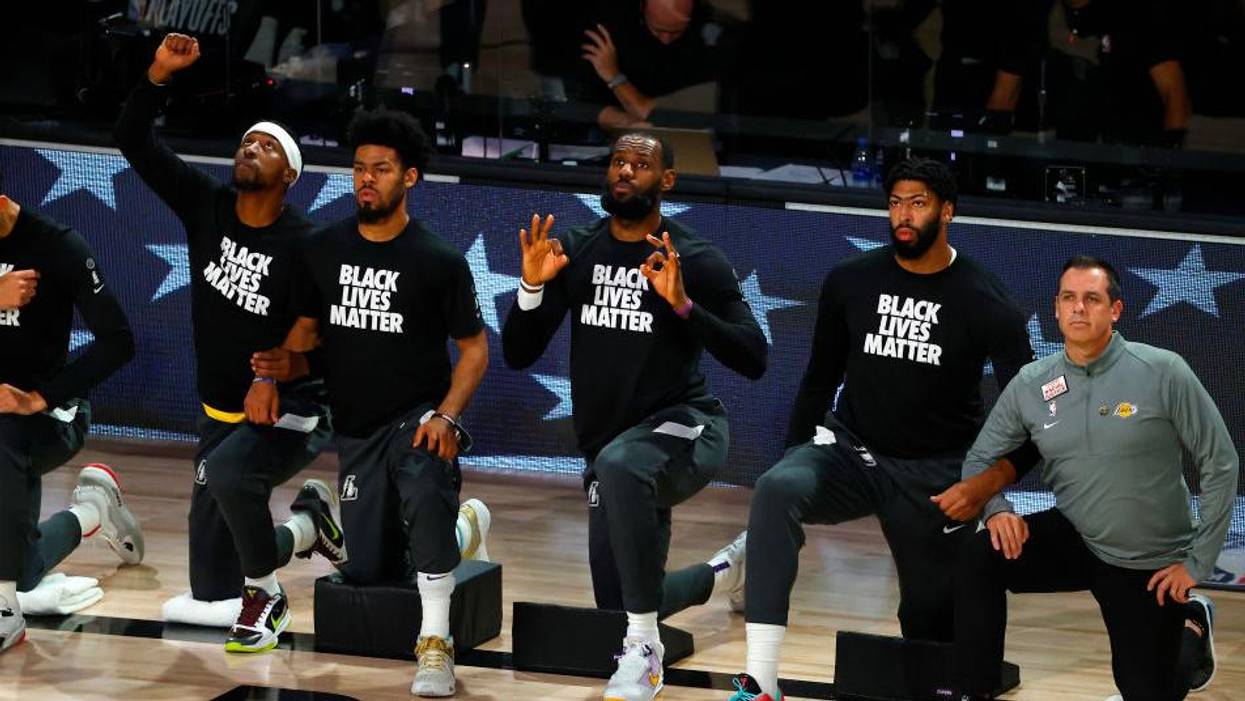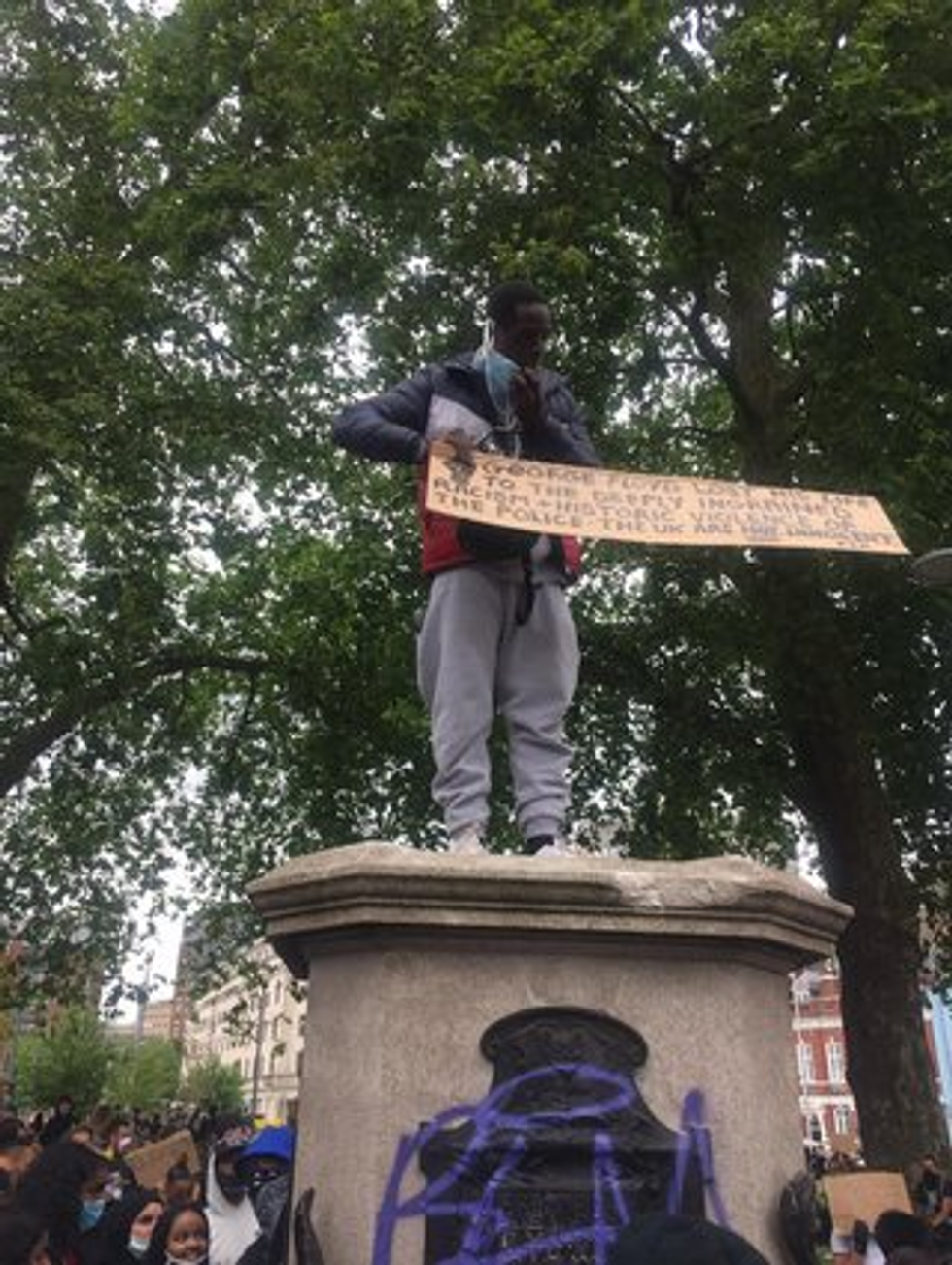One of the most unexpected and remarkable aspects of the nationwide protests is how these demonstrations have spread to other parts of the world, including continental Europe and the United Kingdom. Protests are occurring
not just in British cities with sizable communities of black people--such as London, Birmingham, and Manchester--but also in cities north of the English border, like Glasgow and Edinburgh. The rallies that have taken place across the United Kingdom have reflected the outrage of people of many different ethnicities.Like the United States, Britain has a protracted and shameful history of black deaths in police custody. A significant number of the placards held by British protesters have drawn attention to the abuse of black people in Britain, even as these signs also demanded an end to the transatlantic pandemic of racism--a pandemic which, like Covid-19, has claimed a grotesquely disproportionate number of black lives.
As could be expected, Black Lives Matter protests took place in Bristol, a city in the west of England with a long history of activism and protest emanating from its black communities. But few could have predicted that in the aftermath of the rally, activists would seek, in particularly dramatic fashion, to right a specific wrong and an injustice that had been well over a century in the making.
In Bristol's city center there has stood, from the late-nineteenth century onward, a statue of a merchant who shipped captured African men, women, and children, as part of what historians refer to as the Atlantic Slave Trade, or the Triangular Slave Trade. The merchant, Edward Colston, amassed considerable wealth from his trading activities and in doing so became an important philanthropist within the city, the benefits of his largesse still being enjoyed by modern-day Bristolians.
But just as there's a long history of activism in the United States around the removal of confederate monuments, people have spoken out against Colson's statue since it was erected in the late 19th century. In more recent years, those voices became more animated. Some sought a compromise by asking that a plaque be appended to the monument, drawing attention to how Colston amassed his fortune, and the price paid by hundreds of thousands of African people in this endeavor.
On June 7, matters came to a dramatic head when a number of Black Lives Matter protesters tore down the statue of Colston. For good measure, the damaged statue was rolled to the nearby docks in Bristol city center and dumped into the water of Bristol's harbor--the same harbor from which vessels set sail on their murderous voyages.
Prime Minister Boris Johnson and senior government figures such as Home Secretary Priti Patel were quick to condemn what they declared to be acts of "thuggery," a racially loaded term if ever there was one.
Ironically, just as Johnson, Patel, and others have demanded the vigorous prosecution of those allegedly responsible for the toppling of the statue of Colston, politicians across the U.K. and throughout Europe began, at long last, to take preemptive action to remove statues of equally offensive figures.
These include a statue of the infamous King Leopold II of Belgium, who presided over unspeakable horrors inflicted on the people of the Congo. He was a monarch who ruthlessly and mercilessly exploited both the land and the people of a vast expanse of central Africa. One of his preferred methods to induce harder labor in the Congo, and punish those he believed to be slackers, was to amputate the hands, feet, and limbs of men, women, and children.
What started in Minnesota has the potential to do more than address systemic problems in the United States; people on the other side of the Atlantic have taken these protests into remarkable, extraordinary, and wholly unforeseen directions.
There are numerous statues of him across Belgium, and one of them, in a supposed gesture of retribution, had a hand severed some years ago; another was unceremoniously removed. But one Leopold II statue that's still standing bears a particularly deplorable inscription: "I have undertaken the work in the Congo in the interest of civilization and for the good of Belgium."
In London, Mayor Sadiq Khan, in response to the toppling of the Colson statue, announced a review of the many statues and street names with explicit links to Britain's involvement in the slave trade. A statue of the notorious slaveholder Robert Milligan was already being removed from outside the Museum of London Docklands. Milligan owned several sugar plantations and hundreds of enslaved people in the British colony of Jamaica--He was just one of the many slaveholders and imperialists that were honored in public spaces in Britain.
Parallels can--and should--be drawn between the belated removal of Confederate statues and monuments throughout the South, and the similarly belated removal of statues of brutes such as Colston and Milligan.
What started in Minnesota has the potential to do more than address systemic problems in the United States; people on the other side of the Atlantic have taken these protests into remarkable, extraordinary, and wholly unforeseen directions.
Names of some of those taken by police brutality in the United Kingdom (as seen on placard above): Mark Duggan, Sean Rigg, Sheki Bayoh, Leon Briggs, Christopher Aider, Joy Gardner, Cynthia Jarrett, Cherry Groce, Smiley Culture, Michael Powell, Ricky Bishop, Brian Douglas, Leon Patterson, Derek Bennett, Sarah Reed, Roger Sylvester, Azelle Rodney, Mzee Mohammed, Edson Da Costa, Rashan Charles, Kevin Clarke, Luigi Basile, Leroy Junior Medford, Shane Bryant, Oghene Abboh, Demetre Fraser.





